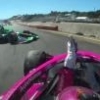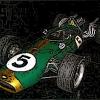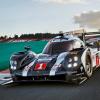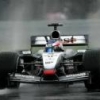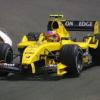I don't know because a rookie is primarily a novice or beginner. Being in your first year in a particular series is very much a secondary meaning of the term, so the word has connotations that don't really apply to someone like Mansell in IndyCar.A rookie is a rookie, no ifs or buts.
Should drivers go straight to top F1 teams? (Split)
#51

Posted 10 November 2019 - 22:53
Advertisement
#52

Posted 10 November 2019 - 23:28
I don't know because a rookie is primarily a novice or beginner. Being in your first year in a particular series is very much a secondary meaning of the term, so the word has connotations that don't really apply to someone like Mansell in IndyCar.
I dunno .... I think you are opening a whole can of worms with your interpretation. You are arbitrarily creating a hierarchy of racing series, with F1 at the top. It works very well in Euro racing (F3, F2, F1), but I think IndyCar is different enough to label a newbie to that series a rookie.
#53

Posted 11 November 2019 - 00:11
Yeah agreed, anyone doing their first season in any "top level" OW category (=F1, Super Formula, Indycar, FE) should get assigned the rookie status upon arrival, no matter how many races they have done in any of the other series. Kobayashi was a rookie when he did his first Super Formula race, Massa was a rookie in his first FE race, Barrichello was a rookie when doing his first Indy race. Even if the drivers may have driven cars as fast or faster in other racing ecosystems - when switching between any of those 4, they always have to learn new cars, new tyres, new tracks, maybe even a new culture. JV was *definitely* a rookie in 1996.I dunno .... I think you are opening a whole can of worms with your interpretation. You are arbitrarily creating a hierarchy of racing series, with F1 at the top. It works very well in Euro racing (F3, F2, F1), but I think IndyCar is different enough to label a newbie to that series a rookie.
It gets more complicated on the few cases where drivers are moving on the ladder downwards (iirc Merhi first raced F1 before debuting in F2, but then it would be awkward to call him a rookie there anymore - the same was true with at least Glock and Pantano in the mid 2000's) or laterally (RHR and Pagenaud awkwardly got IRL Rookie of the Year awards in 2007 and 2012 despite having already had full seasons under their belts on the Champ Car side; same for Brack who was already an Indy 500 winner on his "rookie" CART season). But those cases are few and far between: generally a rookie status is straightforward enough.
Edited by noriaki, 11 November 2019 - 00:12.
#54

Posted 11 November 2019 - 01:21
A rookie is a rookie, no ifs or buts.
Was Anthony Davidson a rookie in 2007 ?
#55

Posted 11 November 2019 - 05:51
Was Anthony Davidson a rookie in 2007 ?
and was everyone a rookie in 1950 ?
#56

Posted 11 November 2019 - 06:26
and was everyone a rookie in 1950 ?
Actually.. no..
#57

Posted 11 November 2019 - 07:36
#58

Posted 11 November 2019 - 07:37
Did Alonso have to do the rookie program at Indy or not?
He did.
#59

Posted 11 November 2019 - 07:40
Was Anthony Davidson a rookie in 2007 ?
No, he was a rookie in 2002.
Advertisement
#60

Posted 11 November 2019 - 08:41
It's just a word we use to informally describe drivers. Why does there need to be a "status"?Yeah agreed, anyone doing their first season in any "top level" OW category (=F1, Super Formula, Indycar, FE) should get assigned the rookie status upon arrival, no matter how many races they have done in any of the other series.
#61

Posted 11 November 2019 - 09:44
Max is an exceptional talent though, perhaps in the mould of Hamilton. Remains to be seen if Charles is right with them but he's also clearly very talented from his generation and already proven his credentials in only two seasons.
Are Norris and Russell cut from the same cloth? Hard to say. Worth remembering a guy by the name of Mika Hakkinen though. Turned out he was a great driver, double WDC and all. Look past the overrated 'outqualified Senna once' nonsense though and he was very raw, a little flawed and even unconvincing at times in his first few seasons.
Not everyone is the same nor do they all evolve to the same degree.
I think that's the point, really. Top teams are generally only interested in exceptional talent, unless they want a #2 to support their main driver. It seems to me making drivers serve a longer apprenticeship somewhere is more about the inability or reluctance of top teams to make a decision than it is about protecting the driver or allowing them to refine their craft. From the driver's perspective, if they are WDC material then they shouldn't need any significant time to bed in anywhere. As already pointed out many former WDCs didn't and it didn't harm them. The next Hamilton shouldn't need several years driving around in e.g. an Alfa or Racing Point.
#62

Posted 11 November 2019 - 09:55
Almost winnning the championship as a rookie AND getting the job done in your second year is not not showing ones true pontential? Eish!
I don't think I said he didn't show potential. Obviously, he did in 2007. I just meant that Hamilton 2007 was not as complete as Hamilton 2018/2019. It's not about speed but rather the experience to know when to push and when to bag a result. When to concede a corner/race and when not. How to cope with weekends when things don't fall into place easily.
These things take some time IMO which is why I think Hamilton, good as he was in 2007, was much better a couple of years later. Coincidentally, when under the wing of Lauda so to speak. I wouldn't be surprised to learn that Lauda had some influence on this maturation, same as happened to Prost 30 years ago.
#63

Posted 11 November 2019 - 10:00
Thanks for your research. What about the other kind of drivers, you know, the ones who made their debut with top teams, but couldn't cope? In the 20 odd years of watching F1, I only know of a few drivers who walked straight into a big team - JV, JPM and LH. You already (conveniently?) brushed aside two of them as special cases. Was a JPM a success or no?
In my book JPM was a success. With a modicum of luck he would have won the WDC. Perhaps his volatility was a weak point in an era of Schumacher and Alonso but he certainly was top notch.
But I don't consider him jumping in a top F1 car unprepared. He did his learning in CART IMO. A title campaign there and an Indy win put him at the same level of JV at the very least. And he did F3000 so he was familiar with some European tracks.
#64

Posted 11 November 2019 - 10:15
#65

Posted 11 November 2019 - 13:28
After a lot of thinking I finally decided on "yes" but only because rookies are prone to mistakes and therefore creates openings for midfield teams to get a podium/win (at least if the tracks had gravel/grass/walls to punish said mistakes).
#66

Posted 11 November 2019 - 14:15
No, he was a rookie in 2002.
In that case your definition becomes strict and utterly meaningless. Zsolt Baumgartner was not a rookie in 2004 because he took part in three races in 2003 ? It renders the whole term pointless and useless.
#67

Posted 11 November 2019 - 14:16
Did Alonso have to do the rookie program at Indy or not?
It's only wiki, but Ruebens is not listed as being a rookie on wiki in his first Indy season.
#68

Posted 11 November 2019 - 14:16
Ultimately the truth is for some yes, it is perfectly reasonable for them to jump straight in, while for others its not and they require some kind of 'apprenticeship' (hate that phrase because none of them are apprentices).
#69

Posted 11 November 2019 - 14:51
He was still a rookie in 2007. They are considered a rookie until completing their first full season.No, he was a rookie in 2002.
#70

Posted 11 November 2019 - 15:14
He was still a rookie in 2007. They are considered a rookie until completing their first full season.
Uhhh, no. Keeping this as a criteria would mean Paul Belmondo (just to name an example) was a rookie entering the 1994 season after not competing in 1993 and having many DNQs in 1992 before being replaced by the very talented Naspetti some 5 races before the end of the season. This all aside from having vast experience racing at Le Mans and having driven extensively in Formula 3000 before participating in his first Grand Prix. I wouldn't have called him a rookie in 1994.
#71

Posted 11 November 2019 - 16:18
In that case your definition becomes strict and utterly meaningless. Zsolt Baumgartner was not a rookie in 2004 because he took part in three races in 2003 ? It renders the whole term pointless and useless.
It’s not meaningless. It’s just the first year they spent in the category. Simple enough.
#72

Posted 11 November 2019 - 16:19
He was still a rookie in 2007. They are considered a rookie until completing their first full season.
I don’t usually see it like that. I’d say perhaps they’re a rookie for a full year after their first race, if you want to be strict about it. Davidson was by no means new to racing F1 cars in 2007. In fact, it was the third season he started at least one race in.
#73

Posted 11 November 2019 - 19:10
What if Gary Paffett did a F1 race now, after billions of testing miles?
What if you do just one race one season then start the full season next year? What about 2 races? 3? Half a season? Half a season plus 1 race? All the races minus 1? All the races but you don't qualify for any?
Edited by noikeee, 11 November 2019 - 19:10.
#74

Posted 11 November 2019 - 19:17
What if you do just one race one season then start the full season next year? What about 2 races? 3? Half a season? Half a season plus 1 race? All the races minus 1? All the races but you don't qualify for any?
No-one ever referred to Damon Hill as a rookie for his 1993 season. Was it because he started two races in 1992 in the Brabham? Or that he attempted to qualify for many more? Or was it his testing miles at Williams before 1993?
Or was it because the term rookie was never used for F1 drivers back then?
A little bit of all the above, in my opinion.
#75

Posted 11 November 2019 - 20:03
Actually.. no..
That's one way of looking at it, and of course it makes sense as many had raced F1 cars in the non-championship GP's for two or three years already. World Champion Nino Farina as an example had even driven in a Grand Prix in 1935. Still my point is using a definition like "you are a rookie until completing your first full season in a championship" you could equally argue they all were.
I was just pointing out some of the silliness that happens when you start applying those black and white, exact letter of the law, strict definitions. It's like people who include old Indy 500 races in their F1 statistics.
Still back to topic. "Should drivers go straight to top F1 teams...."
Answer - Sometimes it's pretty obvious that someone is a generational talent in which case I don't see why not. Lewis and Max are two recent examples we all knew were going to have an impact immediately. Lewis got his break and won in his first year. Max had to wait a year. Neither option as it turns was a career breaker.
#76

Posted 11 November 2019 - 20:14
I think "rookie" can be a slightly subjective description in some cases.
What if Gary Paffett did a F1 race now, after billions of testing miles?
What if you do just one race one season then start the full season next year? What about 2 races? 3? Half a season? Half a season plus 1 race? All the races minus 1? All the races but you don't qualify for any?
Of course it's very arbitrary - but my suggested definition would be that attempting to qualify for more than (roughly) one third of the races of any given season should remove one's rookie status in the series after the season ends.
Or if they were hired as a permanent driver at the start of the season and were subsequently fired after 4 or 5 races or something then that would also count - solely to go around the Yuji Ide type cases because I just feel like he wouldn't have been a rookie had he been re-hired in 2007 anymore - whereas I do feel Giovinazzi is still a rookie. ![]()
#77

Posted 11 November 2019 - 20:37
Of course it's very arbitrary - but my suggested definition would be that attempting to qualify for more than (roughly) one third of the races of any given season should remove one's rookie status in the series after the season ends.
Or if they were hired as a permanent driver at the start of the season and were subsequently fired after 4 or 5 races or something then that would also count - solely to go around the Yuji Ide type cases because I just feel like he wouldn't have been a rookie had he been re-hired in 2007 anymore - whereas I do feel Giovinazzi is still a rookie.
I would amend that by establishing a given number, say 10 races, and stating that rookie status is lost after that number is reached, regardless if it's 1 season or more. So in explanation ... a rookie is one that at the start of the season has entered less than 10 races, in previous season(s).
#78

Posted 11 November 2019 - 20:53
To be honest, I think all rookies should serve some sort of apprenticeship in a midfield team before they get the shot at the top table. It worked for Charles Leclerc last season - away from the pressures and politics he was able to learn the tracks, make mistakes and improve in the Sauber - near back of the grid to front of the midfield over the season, and ditto really for Max Verstappen, Daniel Ricciardo, Sebastian Vettel, Fernando Alonso, Kimi Raikkonen, probably 80% really of the drivers who’ve gone on to anything like ‘greatness’ have made their debuts in mid-grid or worse machinery.
It means that when they get the move up to the top team, they’re ready to hit the ground running. It doesn’t always work like that obviously - but just a season in a Toro Rosso or a Sauber makes all the difference.
But that said, you look at the drivers who’ve gone straight up to the top team right away (Hamilton, Villeneuve, Hill, Coulthard, Montoya, I suppose Norris and Button arguably) and it’s hardly hurt them has it? They’ve been ready, and they’ve probably been allowed a little bit more grace in terms of not quite matching up to their team-mates etc because they’ve been thrown straight in. They go through the same learning process but played out at the sharp end of the grid, and so if Villeneuve qualifies behind Hill, Montoya basically retires from just about every race or Coulthard crashes into the end of the pit lane, then it’s mainly forgiven just as readily as if they were mid-pack in a Sauber. And in the other hand, when Jenson Button is faster than Ralf Schumacher through the Suzuka eases (albeit slower overall) it’s hailed as a flash of future greatness.
I’d certainly like to think this season has been useful for the future career of someone like George Russell, though.
#79

Posted 11 November 2019 - 21:15
It's only wiki, but Ruebens is not listed as being a rookie on wiki in his first Indy season.
Indycar under the leadership of Rodeo King Randy Bernard (2011-13 I think) was making it up as it went along.
Advertisement
#80

Posted 11 November 2019 - 21:17
To be honest, I think all rookies should serve some sort of apprenticeship in a midfield team before they get the shot at the top table. It worked for Charles Leclerc last season - away from the pressures and politics he was able to learn the tracks, make mistakes and improve in the Sauber - near back of the grid to front of the midfield over the season, and ditto really for Max Verstappen, Daniel Ricciardo, Sebastian Vettel, Fernando Alonso, Kimi Raikkonen, probably 80% really of the drivers who’ve gone on to anything like ‘greatness’ have made their debuts in mid-grid or worse machinery.
It means that when they get the move up to the top team, they’re ready to hit the ground running. It doesn’t always work like that obviously - but just a season in a Toro Rosso or a Sauber makes all the difference.
But that said, you look at the drivers who’ve gone straight up to the top team right away (Hamilton, Villeneuve, Hill, Coulthard, Montoya, I suppose Norris and Button arguably) and it’s hardly hurt them has it? They’ve been ready, and they’ve probably been allowed a little bit more grace in terms of not quite matching up to their team-mates etc because they’ve been thrown straight in. They go through the same learning process but played out at the sharp end of the grid, and so if Villeneuve qualifies behind Hill, Montoya basically retires from just about every race or Coulthard crashes into the end of the pit lane, then it’s mainly forgiven just as readily as if they were mid-pack in a Sauber. And in the other hand, when Jenson Button is faster than Ralf Schumacher through the Suzuka eases (albeit slower overall) it’s hailed as a flash of future greatness.
I’d certainly like to think this season has been useful for the future career of someone like George Russell, though.
In which case you are advocating a 3 tier F1! ![]()
#81

Posted 11 November 2019 - 21:23
Seems as if this topic has come mainly from Lewis Hamilton's first season. That was exceptional circumstances during a period were there was unlimited testing and simulators were becoming a whole lot better. Let's not forget, he was already on top of the Bridgestone tyres after using them in the GP2 series and why his 2 main competitors Fernando Alonso and Kimi Raikkonen took some time getting up to speed with them, therefore making his season better than it would be without having significant advantage (like Massa) in this area. This type of scenario you're very unlikely to get again.
The reason why it hasn't happened recently or in the past, teams are safe, the top teams seem to have their drivers locked in for some years who of course are stable and most of the time the best of the drivers, the sever lack of testing, and the fact it's much less pressure for the driver who can hone in on his skills. Otherwise you may end up with what looked like a decent/promising talent getting destroyed like Gasly, Nelson Piquet jnr. or Vandoorne.
#82

Posted 12 November 2019 - 08:15
Seems as if this topic has come mainly from Lewis Hamilton's first season. That was exceptional circumstances during a period were there was unlimited testing and simulators were becoming a whole lot better. Let's not forget, he was already on top of the Bridgestone tyres after using them in the GP2 series and why his 2 main competitors Fernando Alonso and Kimi Raikkonen took some time getting up to speed with them, therefore making his season better than it would be without having significant advantage (like Massa) in this area. This type of scenario you're very unlikely to get again.
The reason why it hasn't happened recently or in the past, teams are safe, the top teams seem to have their drivers locked in for some years who of course are stable and most of the time the best of the drivers, the sever lack of testing, and the fact it's much less pressure for the driver who can hone in on his skills. Otherwise you may end up with what looked like a decent/promising talent getting destroyed like Gasly, Nelson Piquet jnr. or Vandoorne.
speaking as the one who made the initial observation, that's not the case. It stems from the trend that has developed recently where top teams will want a driver to complete several seasons in a junior team before committing to giving them a seat in a front one, a sentiment which I've seen echoed on here more often than not. A single season I get (although even there with a driver who has shown great promise in lower formulae I still think he should get the chance), but any more than that is not necessary IMO. I maintain if the drivers are top quality material they won't get destroyed and it's only those who aren't at that level who will essentially be found out.
Hamilton's just the most obvious example. But I don't think either Max or Charles would have been "destroyed" if either had gone straight to the teams they are in now. Same for Vettel when he joined Red Bull. And I also don't think the next-to-be-discovered superstar will benefit in any way from having to spend multiple seasons in a back marker. To me the caution is more because the teams are afraid to make a decision - like Wolff has shown to be every time he procrastinates over Bottas' contract - rather than because it's beneficial to the drivers themselves.
#83

Posted 12 November 2019 - 08:17
To be honest, I think all rookies should serve some sort of apprenticeship in a midfield team before they get the shot at the top table. It worked for Charles Leclerc last season - away from the pressures and politics he was able to learn the tracks, make mistakes and improve in the Sauber - near back of the grid to front of the midfield over the season, and ditto really for Max Verstappen, Daniel Ricciardo, Sebastian Vettel, Fernando Alonso, Kimi Raikkonen, probably 80% really of the drivers who’ve gone on to anything like ‘greatness’ have made their debuts in mid-grid or worse machinery.
It means that when they get the move up to the top team, they’re ready to hit the ground running. It doesn’t always work like that obviously - but just a season in a Toro Rosso or a Sauber makes all the difference.
But that said, you look at the drivers who’ve gone straight up to the top team right away (Hamilton, Villeneuve, Hill, Coulthard, Montoya, I suppose Norris and Button arguably) and it’s hardly hurt them has it? They’ve been ready, and they’ve probably been allowed a little bit more grace in terms of not quite matching up to their team-mates etc because they’ve been thrown straight in. They go through the same learning process but played out at the sharp end of the grid, and so if Villeneuve qualifies behind Hill, Montoya basically retires from just about every race or Coulthard crashes into the end of the pit lane, then it’s mainly forgiven just as readily as if they were mid-pack in a Sauber. And in the other hand, when Jenson Button is faster than Ralf Schumacher through the Suzuka eases (albeit slower overall) it’s hailed as a flash of future greatness.
I’d certainly like to think this season has been useful for the future career of someone like George Russell, though.
Exactly. So why is it even necessary?
#84

Posted 12 November 2019 - 08:17
To be honest, I think all rookies should serve some sort of apprenticeship in a midfield team before they get the shot at the top table. It worked for Charles Leclerc last season - away from the pressures and politics he was able to learn the tracks, make mistakes and improve in the Sauber - near back of the grid to front of the midfield over the season, and ditto really for Max Verstappen, Daniel Ricciardo, Sebastian Vettel, Fernando Alonso, Kimi Raikkonen, probably 80% really of the drivers who’ve gone on to anything like ‘greatness’ have made their debuts in mid-grid or worse machinery.
It means that when they get the move up to the top team, they’re ready to hit the ground running. It doesn’t always work like that obviously - but just a season in a Toro Rosso or a Sauber makes all the difference.
But that said, you look at the drivers who’ve gone straight up to the top team right away (Hamilton, Villeneuve, Hill, Coulthard, Montoya, I suppose Norris and Button arguably) and it’s hardly hurt them has it? They’ve been ready, and they’ve probably been allowed a little bit more grace in terms of not quite matching up to their team-mates etc because they’ve been thrown straight in. They go through the same learning process but played out at the sharp end of the grid, and so if Villeneuve qualifies behind Hill, Montoya basically retires from just about every race or Coulthard crashes into the end of the pit lane, then it’s mainly forgiven just as readily as if they were mid-pack in a Sauber. And in the other hand, when Jenson Button is faster than Ralf Schumacher through the Suzuka eases (albeit slower overall) it’s hailed as a flash of future greatness.
I’d certainly like to think this season has been useful for the future career of someone like George Russell, though.
It is true that this has worked out for the drivers you mention here. But there have been a few drivers who did get a top drive immediately and it didn't work out. Perhaps Jos Verstappen is a good example. He was extremely hot property in 1993, got the Benetton drive and it destroyed his reputation after which he had flashes of brilliance in backmarkers. If he had stayed Benetton's reserve driver and learned at Ligier or such, I think it would have been much better for his career. I wouldn't say he was a lost WDC (because I think he didn't have the right mentality) but he should have won a couple of Grand Prix.
#85

Posted 12 November 2019 - 08:43
I think there were two types of "opportunity" to go into a top team in the 90s. One was to go to Williams and one was to be Schumacher's team-mate. Swap the drivers round and you'd get pretty much the opposite results. Coming in alongside Schumacher in his one-car team was never an opportunity and no good could come from it. So if Verstappen had gone somewhere else in 1994 and joined Benetton in 1995, the same would have happened.It is true that this has worked out for the drivers you mention here. But there have been a few drivers who did get a top drive immediately and it didn't work out. Perhaps Jos Verstappen is a good example. He was extremely hot property in 1993, got the Benetton drive and it destroyed his reputation after which he had flashes of brilliance in backmarkers. If he had stayed Benetton's reserve driver and learned at Ligier or such, I think it would have been much better for his career.
Plus also, Schumacher was better than the Williams drivers of the time so it would be harder to look good against him anyway.
#86

Posted 12 November 2019 - 08:48
It is true that this has worked out for the drivers you mention here. But there have been a few drivers who did get a top drive immediately and it didn't work out. Perhaps Jos Verstappen is a good example. He was extremely hot property in 1993, got the Benetton drive and it destroyed his reputation after which he had flashes of brilliance in backmarkers. If he had stayed Benetton's reserve driver and learned at Ligier or such, I think it would have been much better for his career. I wouldn't say he was a lost WDC (because I think he didn't have the right mentality) but he should have won a couple of Grand Prix.
Though that team was exceptionally bad on their second driver, or third driver that JV was.
#87

Posted 12 November 2019 - 10:47
Jos Verstappen. Pierre Gasly. Jaime Alguersuari. Daniil Kvyat. Sergio Perez. Nearly happened to Jenson Button, remember his 2nd season. Dave Walker. Pierluigi Martini. Andrea de Cesaris. I'd argue Pedro Lamy.
What constitutes too early or too high a level of pressure depends on each driver. Some never had what it took in the first place - but some proved later on with much more experience, they could be much more dependable drivers than the initial jokers they were thought of.
#88

Posted 12 November 2019 - 11:39
The thing is that a rookie is unlikely to perform at his very peak yet. However, if a rookie is very talented or even a supertalent, then even without yet performing at his peak, he is likely to be already better than an average midfielder or a backmarker driver. Another factor is uncertainty - even if you think a kid is talented, you can't be 100% sure, how good he might be once he really starts racing at the highest echelon.
So it depends on circumstances. As a team you take a bit of a gamble, and also you are prepared to lose some points due to rookie mistakes, but if the alternatives on the driver market aren't any good, then why not. For example hiring Hamilton over de la Rosa back then was a no-brainer in this situation I think. McLaren clearly believed Hamilton was special and de la Rosa was never going to do much, so there you go.
Edited by sopa, 12 November 2019 - 11:40.
#89

Posted 12 November 2019 - 13:35
speaking as the one who made the initial observation, that's not the case. It stems from the trend that has developed recently where top teams will want a driver to complete several seasons in a junior team before committing to giving them a seat in a front one, a sentiment which I've seen echoed on here more often than not. A single season I get (although even there with a driver who has shown great promise in lower formulae I still think he should get the chance), but any more than that is not necessary IMO.
But there is no such trend. There are only three top teams. Ferrari and Red Bull between them have three drivers who did not complete several seasons in a junior team.
Edited by Sterzo, 12 November 2019 - 13:35.
#90

Posted 12 November 2019 - 13:45
But there is no such trend. There are only three top teams. Ferrari and Red Bull between them have three drivers who did not complete several seasons in a junior team.
And look how much angst there was with Leclerc being given the seat, or Wolf's procrastinating over whether to replace Bottas and wanting other drivers to learn a bit more first. Albon got his chance because Gasly was utterly abysmal so they didn't have much choice, but Wolff lost out on Verstappen because he thought it was too soon to promote him, and this year he's gone on record to say it's too soon for Russell to be in a top team. And we regularly get posts on here which promote drivers spending a significant time in a junior team first. I'm saying all that caution is unnecessary
#91

Posted 12 November 2019 - 19:48
Hamilton's just the most obvious example. But I don't think either Max or Charles would have been "destroyed" if either had gone straight to the teams they are in now. Same for Vettel when he joined Red Bull. And I also don't think the next-to-be-discovered superstar will benefit in any way from having to spend multiple seasons in a back marker. To me the caution is more because the teams are afraid to make a decision - like Wolff has shown to be every time he procrastinates over Bottas' contract - rather than because it's beneficial to the drivers themselves.
I believe there are no truely exceptional drivers any more, compared to maybe the early 2000s and before .
Exceptional meaning they are significantly more competent than the majority of the field on most occassions .
Fangio, Clark, Senna, Lauda, Schumacher etc. had strong opponents, but also a big number of opponents who were clearly inferior .
It's a lot easier to shine when half the field is made of hungover playboys . Not to mention the huge differences between cars in the earlier days .
There are no superstars anymore; Hamilton got beaten by Rosberg, Vettel by Ricciardo - not because they were equals, but because the driver's basic skills are so closely matched today that raw speed and great racecraft are not enough to become a WDC .
You need experience , a strong position in the team and in the sport in general, and a very professional work/life management . Consistency , making the right choices, and sometimes even luck .
That's why Hamilton is where he is now, and Alonso is not .





